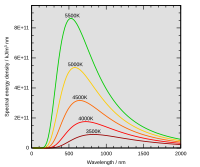
Photo from wikipedia
Research into strong light-matter interactions continues to fascinate, being spurred on by unforeseen and often spectacular experimental observations. Properties that were considered to depend exclusively on material composition have been… Click to show full abstract
Research into strong light-matter interactions continues to fascinate, being spurred on by unforeseen and often spectacular experimental observations. Properties that were considered to depend exclusively on material composition have been found to be drastically altered when a material is placed inside a resonant optical cavity. This is nowhere more the case than in the field of intermolecular energy transfer, where polaritonic states formed as a result of strong light-matter interactions have been shown to promote energy transfer over distances vastly exceeding conventional limits. In this review, we provide the reader with a succinct account of the fundamental concepts of intermolecular energy transfer, and how they are modified by strong light-matter interactions. We also summarize recent experimental advances in the area, including in optoelectronic device contexts, and highlight both the potential and challenges that remain in this exciting field of research going forward.
Journal Title: Chemical reviews
Year Published: 2023
Link to full text (if available)
Share on Social Media: Sign Up to like & get
recommendations!